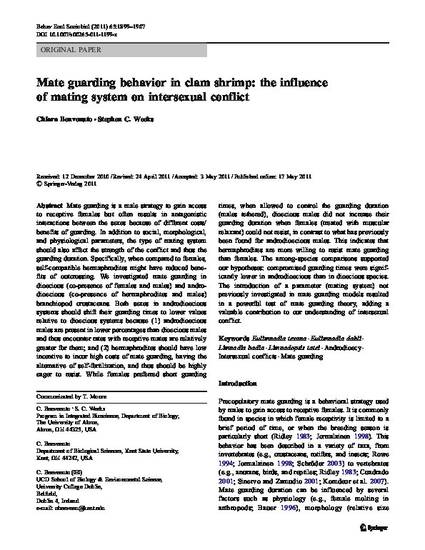
Article
Mate guarding behavior in clam shrimp: the influence of mating system on intersexual conflict
Behavioral Ecology and Sociobiology
(2011)
Abstract
Mate guarding is a male strategy to gain access to receptive females but often results in antagonistic
interactions between the sexes because of different costs/benefits of guarding. In addition to social, morphological, and physiological parameters, the type of mating system should also affect the strength of the conflict and thus the guarding duration. Specifically, when compared to females, self-compatible hermaphrodites might have reduced benefits of outcrossing. We investigated mate guarding in dioecious (co-presence of females and males) and androdioecious (co-presence of hermaphrodites and males) branchiopod crustaceans. Both sexes in androdioecious systems should shift their guarding times to lower values relative to dioecious systems because (1) androdioecious males are present in lower percentages than dioecious males and thus encounter rates with receptive mates are relatively greater for them; and (2) hermaphrodites should have low incentive to incur high costs of mate guarding, having the alternative of self-fertilization, and thus should be highly eager to resist. While females preferred short guarding times, when allowed to control the guarding duration (males tethered), dioecious males did not increase their guarding duration when females (treated with muscular relaxant) could not resist, in contrast to what has previously been found for androdioecious males. This indicates that hermaphrodites are more willing to resist mate guarding than females. The among-species comparisons supported our hypotheses: compromised guarding times were significantly lower in androdioecious than in dioecious species. The introduction of a parameter (mating system) not previously investigated in mate guarding models resulted in a powerful test of mate guarding theory, adding a valuable contribution to our understanding of intersexual conflict.
Keywords
- ulimnadia texana . Eulimnadia dahli . Limnadia badia . Limnadopsis tatei . Androdioecy . Intersexual conflicts . Mate guarding
Disciplines
Publication Date
2011
DOI
10.1007/s00265-011-1199-x
Citation Information
Chiara Benvenuto and Stephen C. Weeks. "Mate guarding behavior in clam shrimp: the influence of mating system on intersexual conflict" Behavioral Ecology and Sociobiology Vol. 65 (2011) p. 1899 - 1907 Available at: http://works.bepress.com/stephen_weeks/35/
